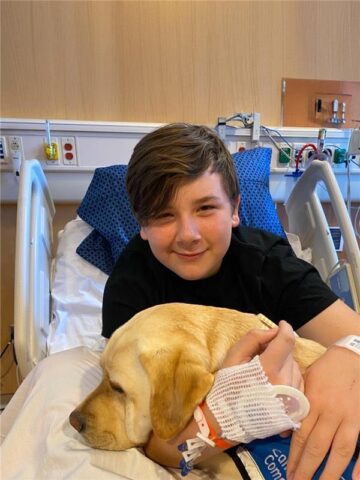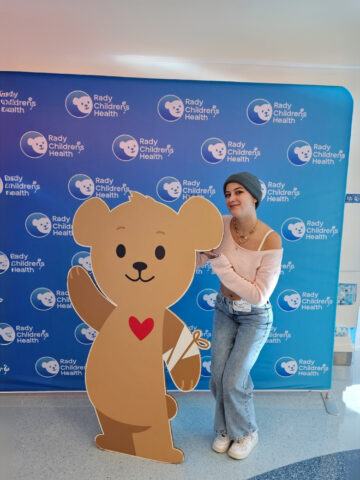Every morning, 17-year-old Israel begins his day by lifting weights and, on alternate days, adding in a two-mile run.
Then, it’s time for a hearty breakfast fit for any teen bulking up for football season – four or five eggs, bacon and two slices of toast.
Israel Escobedo, a high school senior, then flips open his laptop for virtual classes.
In the afternoon, he again pumps iron to add muscle to his 6-foot-1 frame.
Israel, a middle linebacker, is preparing himself for a 10-game season that may or may not start in December, depending on COVID-19 guidelines.
That he’s in such great shape – just 15 pounds short of his usual weight of 200 – is something to behold, considering that earlier this year Israel underwent a pediatric bone marrow transplant (BMT) after being diagnosed with high-risk B-cell acute lymphoblastic leukemia (ALL).
Israel’s journey has been one of baby steps, hurdles and at times, low points.
But through it all, his clinicians at the Hyundai Cancer Institute at CHOC say Israel has exhibited grace, kindness and a positive attitude, despite the fear and pain that comes with any cancer diagnosis.
Israel saw his grandfather Jose battle prostate cancer for eight years before he passed away several years ago. So, when Israel found out last year that he had leukemia, he was floored.
“Honestly, I was just scared,” Israel says. “I’ve always had big goals and plans. I was always outgoing and healthy. I didn’t know what to expect.”
But how Israel handled his diagnosis and subsequent BMT – a process that can bring with it a grueling recovery process, with a brand-new and vulnerable immune system, especially for the first 100 days – has inspired his team at CHOC.
“My goodness,” says Miranda Wichelns, a social worker who helped care for Israel. “We’re all kind of in awe of him.”
A shining example
Israel was not able to attend the first day of in-person varsity football practice this season, but his pediatric oncologist Dr. Rishikesh Chavan hopes that Israel may be able to practice with his teammates soon.
For Dr. Chavan, who also serves as director of CHOC’s Blood and Marrow Transplant Program, Israel’s excellent recovery from his BMT is a shining example of how most BMT patients eventually resume normal lives.
“A lot of people think of a transplant as a big, bad thing,” Dr. Chavan says.
With the proper medical care, it’s not.
“When you look at Israel today,” Dr. Chavan says, “you would not be able to tell that he had a bone marrow transplant just eight months ago.”
A perfect match in the family
Back in August 2019, Israel wasn’t feeling his usual healthy self. He found it difficult keeping down food.
His dermatologist, who had been checking Israel’s blood monthly because of the acne medication he had been prescribed, noticed an alarmingly low number of white blood cells.
Israel’s primary care physician was also very concerned and referred him to CHOC.
On Israel’s first night at CHOC, his child life specialist Carly helped ease his jitters.
The next day, pediatric oncologist Dr. Carol Lin diagnosed Israel with ALL.
Israel underwent several rounds of chemotherapy before Dr. Chavan and Dr. Lin, along with the pediatric leukemia team, determined he needed a BMT.
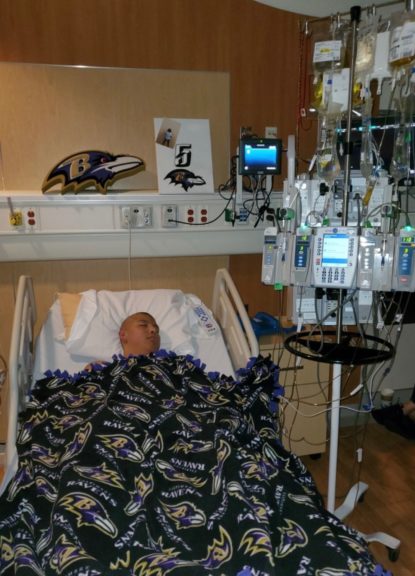
The actual day of BMT is relatively simple, akin to receiving a blood transfusion – but a lot goes on before and after the procedure.
Israel needed a donor and his sister Genesis turned out to be a perfect match.
“I just didn’t want to sit around and see him suffer,” says Genesis, who was 14 at the time of the transplant. “It was good to know I could actually help him.”
Israel is forever grateful for his sister.
“I love her,” he says, adding with a laugh, “but there are days I can’t stand her.”
Undergoing a bone marrow transplant
The process of donating her blood-forming cells – or blood stem cells – for transplantation wasn’t too painful, Genesis says.
After a BMT, a recipient’s immune system becomes like that of a newborn baby. The immune system needs to develop and be cared for to keep toxicities from wreaking havoc on the body.
Dr. Chavan uses the metaphor of gardening to describe a BMT.
“It’s like taking a seed from a plant and then replanting it somewhere else,” he says. “Think about the cancer cells as weeds in your garden. Before the transplant, through a combination of chemotherapy and radiation, you are not only able to get rid of the weeds, but you are also preparing the soil. Then you plant the new seed.”
Keeping a positive attitude throughout treatment
A common complication following a BMT is Graft-versus-host-disease (GVHD), in which the recipient’s new immune system, which is actually the donor’s immune system, may attack the recipient’s body. Symptoms include rash, mouth ulcers, abdominal pain, vomiting and diarrhea. Steroids and other immunosuppressive medications are used to treat the condition while preventing infections.
Israel had a moderate case of GVHD but bounced right back.
His lowest point, he said, happened when he returned home from CHOC just before the COVID-19 pandemic took hold in mid-March. The emotional toll of his journey finally sunk in, and it took time to adjust to a new normal.
“But I got through it and I feel amazing now,” he says. “I put myself to God, and He got me through it.”
Israel credits his close family — Genesis, his father Juan, his mother Marcia and older brother Joshua — and his team at CHOC for helping him get through his medical crisis.
“They have some of the most amazing people there,” Israel said of CHOC. “They made me feel like I was at home. They’re great people.”
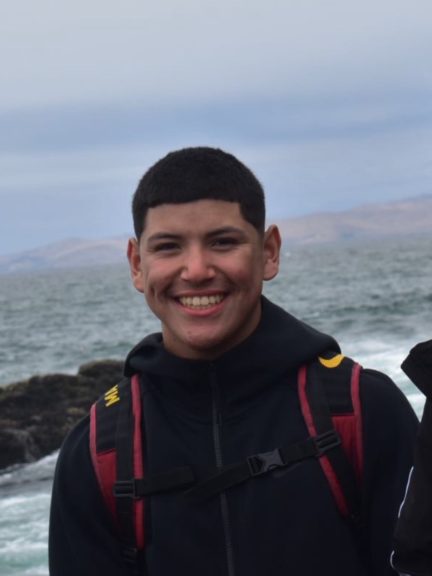
CHOC staffers noted how polite Israel was throughout his treatment and BMT recovery.
Monika Benson, a registered nurse, was Israel’s post-transplant case coordinator.
“He’s an incredible young man,” Benson says. “His outlook during this has been amazing. He’s one of the sweetest kids I’ve met. A lot of bone marrow transplant patients get beat down. He had his down moments, but he remained positive through it all.”
Benson noted that BMT patients go through a lot of social isolation. Most can’t even leave their hospital room for 10 to 20 days post-transplant while their new immune system is at its most vulnerable level.
“Going into the procedure positive and coming out of the transplant positive can make a big difference,” Benson says.
Israel says with his positive attitude, he was simply demonstrating lessons he’s been taught since day one.
“My whole life, I’ve always been taught manners and to respect my elders. I must respect others so I can be respected,” Israel says. “And I’m a very positive and energetic person. I’m always moving with a smile on my face every day.”
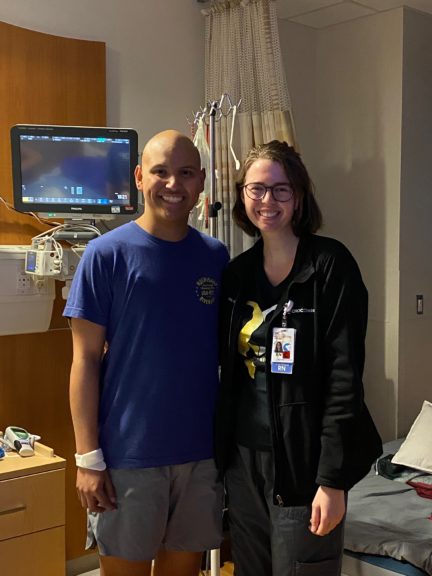
The importance of wearing a mask
Living through a pandemic – while recovering from cancer treatment and a BMT – has its challenges, but one thing Israel was already used to doing even before COVID-19 hit was wearing a mask.
He recalls one day earlier this year, when he was watching his teammates practice amid his chemotherapy treatment leading up to his transplant. He didn’t wear a face covering that day and got so sick he had to be hospitalized.
“I believe masks are a big help,” he says.
Masks have always been a common recommendation and practice for post-BMT patients at least in initial days post-transplant.
Looking ahead
Before he was diagnosed, Israel was looking forward to playing football in college or possibly joining the military.
Now, he wants to become a nurse.
“A lot of nurses helped me get through this,” he says. “I want to return the favor and help kids that are going through the same thing that I went through.”
Get more expert health advice delivered to your inbox monthly by subscribing to the KidsHealth newsletter here.
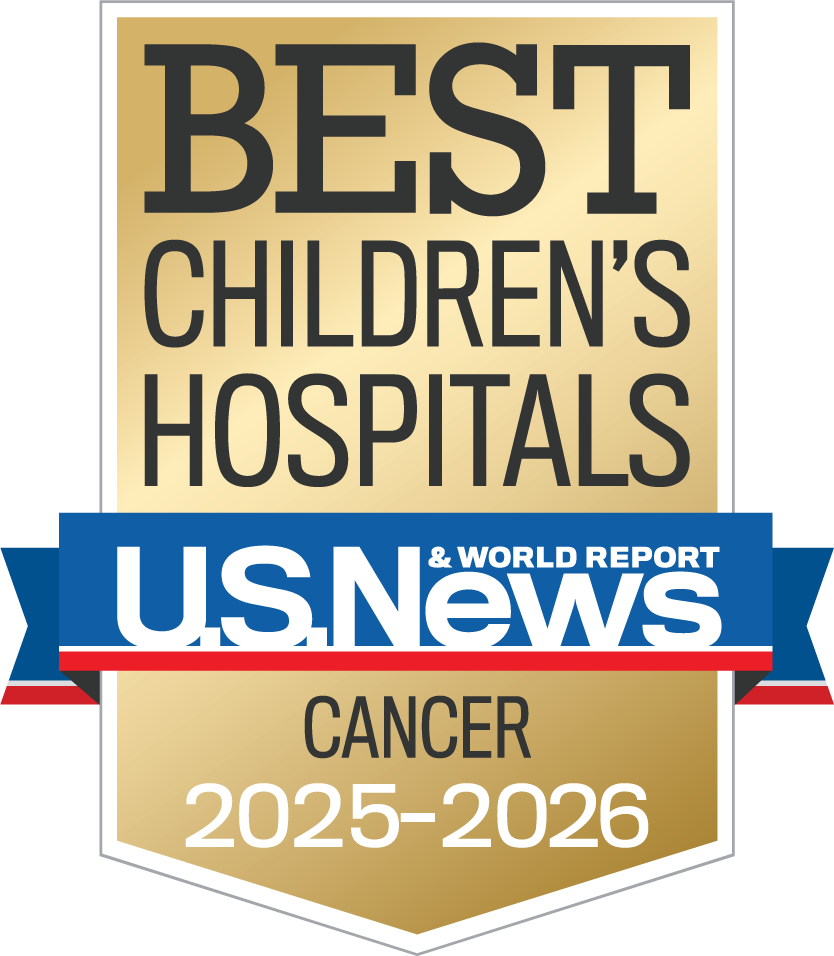
Learn more the Hyundai Cancer Center at CHOC
CHOC Hospital was named one of the nation’s best children’s hospitals by U.S. News & World Report in its 2025-26 Best Children’s Hospitals rankings and ranked in the oncology specialty.

